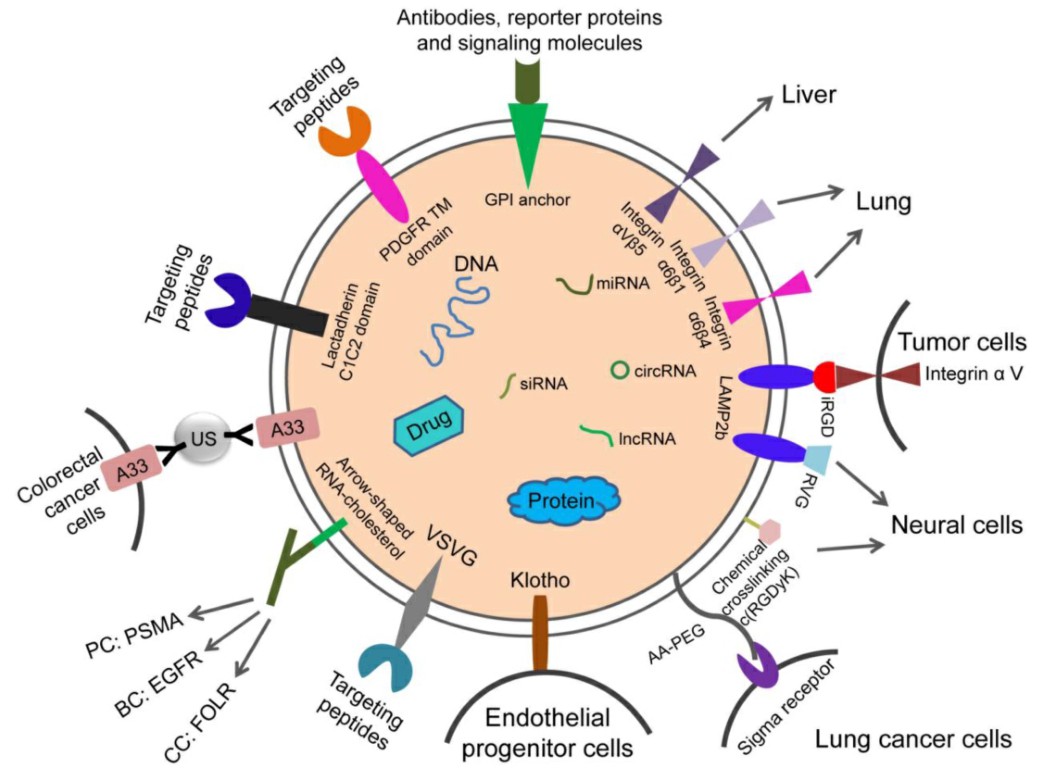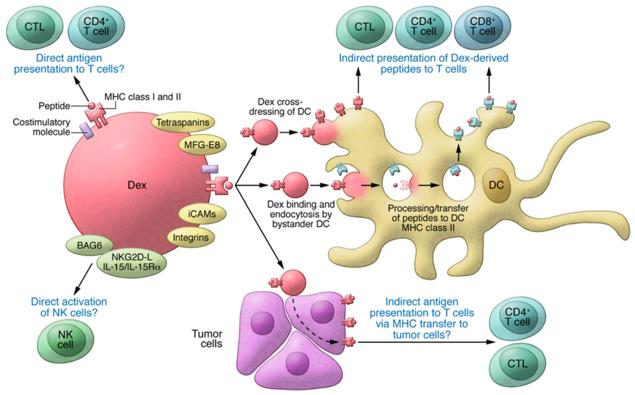Therapeutic Exosomes for Tumor and Cancer
Based on the advantages of circulating biocompatibility and potential function in mimicking mother cells, the preparation and efficacy analysis of exosomes is very promising. Creative Biolabs can provide a range of services for the preparation, characterization and functional analysis of exosomes, expanding new ideas for tumor and cancer treatment.
Overview
Exosomes are widely distributed in various biological fluids. It has been shown that exosomes not only broadly regulate disease development, but are also involved in altering TME. Also, exosomes cross biological barriers and low immunogenicity, which can improve the biocompatibility and stability of drugs in the long circulation and increase the enrichment rate to target tissues and therapeutic efficiency. Histological analysis techniques and sequencing have been applied to analyze molecules on vesicles membranes and inside, which could provide the possibility to reveal the mechanism of function.
Based on strategies to modulate the immune response and tumor microenvironment, exosomes are regarded as potential therapeutic candidates in various tumors and cancers, including but not limited to:
Therapeutic Exosome Analysis Services at Creative Biolabs
Based on the inherent nature of mediating communication, the analysis of exosome fractions is of interest to understand their therapeutic effects. For example, transmembrane proteins and anchoring proteins can enhance the endocytic effect of target cells. Comparison of in vitro experiments showed that paclitaxel packaged into exosomes is 50 times more toxic to cancer cells than free paclitaxel. Furthermore, thanks to the modification of membrane surface components and the engineered loading of contents, exosomes can target specific tumors and treat them efficiently. Exosomes modified with Integrin αVβ5 can be targeted for delivery to the liver, while Integrin α6β1/ α6β4-modified exosomes are more enriched in the lung. By binding the arrow RNA cholesterol on the exosome membrane to elements such as PSMA, EGFR and FOLR, the loaded siRNAs can be targeted for delivery to the lesion sites of prostate, breast and colorectal cancers, respectively, thereby interfering with the expression of target disease-causing genes.
 Fig.1 Design strategies for therapeutic exosome targeting. (Liu & Su, 2019)
Fig.1 Design strategies for therapeutic exosome targeting. (Liu & Su, 2019)
Therapeutic Exosome Development Service at Creative Biolabs
Exosomes of multiple cellular origins contain a range of components similar to their donor cells and can exert therapeutic effects such as activation of immunity in tumor and cancer. For example, NK cell-derived exosomes can provide FASL and perforin to enhance T cell immune responses and tumor toxicity, accompanied by tumor-specific accumulation. Dendritic cell-derived exosomes (Dex) can activate ligands of natural killer cells and cross-presentation of endogenous antigens to induce specific CD8+ T lymphocyte anti-tumor responses after modification of tumor-associated antigens. Activated T cell-derived exosomes alleviate PD-L1-induced immune dysfunction in triple-negative breast cancer by supplementing PD-1. Thus, exosomes from multiple sources can exert therapeutic effects against tumor and cancer by inducing immune cell activity and altering the status of TME.
 Fig.2 Dex interactions with immune cells. (Pitt, 2016)
Fig.2 Dex interactions with immune cells. (Pitt, 2016)
Creative Biolabs is focused on providing "one-stop" solutions for research on therapeutic exosomes for tumor and cancer, including discovery and development services. We have established a comprehensive platform for exosome extraction, purification and functional analysis, and have provided high quality services to a large number of researchers. Please contact us to solve your problem.
References
-
Liu, C.; Su, C. Design strategies and application progress of therapeutic exosomes. Theranostics. 2019, 9(4): 1015-1028.
-
Pitt, J.M.; et al. Dendritic cell-derived exosomes for cancer therapy. J Clin Invest. 2016, 126(4): 1224-1232.
For Research Use Only. Cannot be used by patients.
Related Services:

 Fig.1 Design strategies for therapeutic exosome targeting. (Liu & Su, 2019)
Fig.1 Design strategies for therapeutic exosome targeting. (Liu & Su, 2019)
 Fig.2 Dex interactions with immune cells. (Pitt, 2016)
Fig.2 Dex interactions with immune cells. (Pitt, 2016)









